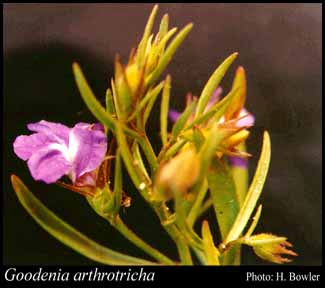- Reference
- Fl.Austral. 4:62 (1868)
- Conservation Code
-
Threatened
A taxon name retains its ‘Threatened’ status until a new name has been officially endorsed and appears in the Gazettal Notice.
- Naturalised Status
- Native to Western Australia
- Name Status
- Current
Erect perennial, herb, to 0.4 m high. Fl. blue, Oct to Nov. Gravel. Granite rocks, slopes.

Scientific Description
Stems unribbed. Leaves flat, 20-50 mm long, 1.5-3 mm wide, Indumentum present, with sparse, glandular hairs; margins entire. Bracteoles present, 7-10 mm long, hairy, with glandular hairs. Pedicel pedicellate, Pedicel length the pedicels 3-7 mm long, Indumentum present, Hair type with glandular hairs. Calyx lobes present, Calyx length 11-15 mm long, hairy, with dense, glandular hairs. Corolla blue, 15-25 mm long, auriculate, not spurred, hairy on the outside, with dense, glandular hairs, hairy on the inside; central lobes 3.5-6 mm long, with wings; outer lobes 10-17 mm long, wings present on both sides, 2-2.5 mm wide. Anthers free. Ovary inferior, not gibbose; style 8-10.5 mm long, hairy; indusium single, hairy; ovules more than two. Flowers in October, November and December. Occurs in the Swan Coastal Plain (SWA), Avon Wheatbelt (AW) and Jarrah Forest (JF) IBRA Region(s), of the South West (SW) Botanical Province. Conservation Code: Conservation code Threatened (T).
Distribution
- IBRA Regions
- Avon Wheatbelt, Jarrah Forest, Swan Coastal Plain.
- IBRA Subregions
- Dandaragan Plateau, Katanning, Northern Jarrah Forest.
- Local Government Areas (LGAs)
- Chittering, Gingin, Gosnells, Moora, Victoria Plains.